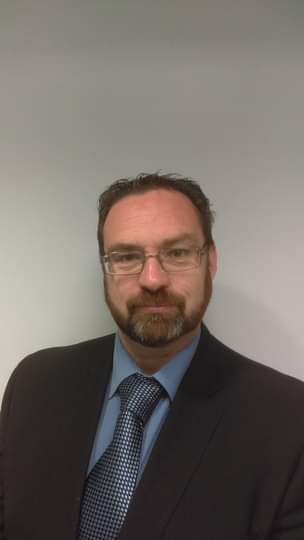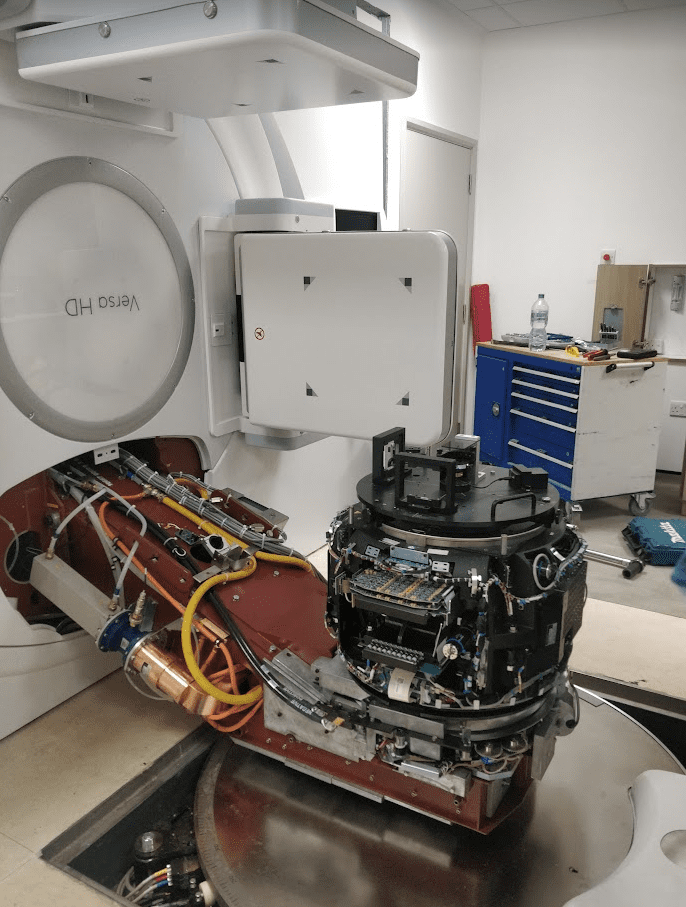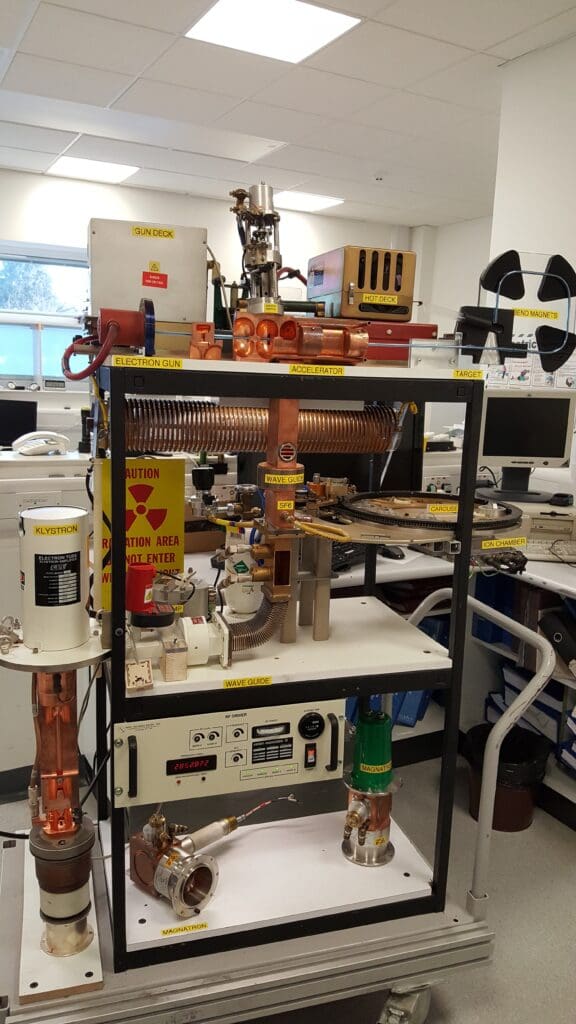Leading a team of Radiotherapy Equipment Engineers in the UK
Richard Baker is the Engineering Manager for GenesisCare in the UK and has shared his career path and current challenges as a manager of a team of Radiotherapy Engineers (Accelerator Engineers/Radiotherapy Equipment Engineers).
What is a Radiotherapy Equipment Engineer and what do they do?


From helping Dad in the garage to handling expensive and life-saving equipment
Could you give a brief description of your background and what led you to work in medical engineering?
I am an Electrician by trade with qualifications in Electronics.
In 2007 I started a job in the Estates Department at our local Hospital as an electrician. While there, I made various test boxes for the nurse call systems. The only place I could get the components from at the time was the Radiotherapy Engineering workshop. So, I built up a relationship with the engineers.
Then after a few years an opening came up in their department. Since the moment I went for the interview, and they showed me around the machines I have never wanted to work in anything else.
Were there any childhood interests which were a factor?
My Father was an engineer and from an early age I was by his side in the garage fixing things. That’s why I love anything mechanical or electrical.
Has there been a particular person who has inspired you?
My father, of course, but I have been very lucky to have worked with and still be friends with some of the best engineers I know.
How have you stayed up to date as technology has changed so much over your career?
I attend regular meetings and update training with the manufacturers of the machines and various other training events. Being around the technology every day is also a learning curve. Every day is a school day.
Typical Day leading a team of Radiotherapy Equipment Engineers
What is your typical day like?
There isn’t one typical day. There can be days which go past with just niggly little faults to deal with. Then on another day – four machines go down at once. I can say Radiotherapy Engineering keeps me and the team on our toes every single day.
How much of your time is spent ‘hands on’ and how much managing and team leading?
Nowadays, I spend very little time on the tools. I do miss it terribly, but I am also fortunate to have the opportunity to manage the engineers and make their working life as good as possible. A key things is that I always put myself in their shoes when I am asking them to do something.
Which other people in the workplace give you support?
My boss gives me support but he is based in Australia. I like to look for mentors in the workplace. I also work closely with the radiotherapists and physicists. We are a close team.
Equipment used by Radiotherapy Engineers


What exactly do your team service in terms of machines and devices?
We predominantly maintain the Radiotherapy machines. These use high powered microwaves (up to 20MW) to accelerate electrons to 99.9% the speed of light. We then either leave them as electrons or turn them into X-Ray beams to primarily treat cancer.
(Radiotherapy machines are also known as Linear Accelerators, and the engineers who service them are known as Linear Accelerator Engineers / Accelerator Engineers).
Most challenging part of the job leading a team of Radiotherapy Equipment Engineers
What is the most challenging part of your job – technical side, people management or dealing with other parts of the organisation?
The most challenging part of the job is probably when you have a broken machine, and you know the impact this is having on the patients waiting for life changing treatment.
The other challenge is recruitment as finding good engineers is getting increasingly difficult.
What has been your most challenging job to date?
I think my biggest challenge was when I first became a manager.
It was only my second week as a manager when a machine broke, and we suspected it was due to a part costing over £100,000. It was also going to take weeks to do the physics checks to return the machine into service. We could not be certain that the fault was due to this very expensive part until we had removed it for testing.
I had to make the call to remove the part and order the replacement. We had to do everything we could to be as sure as possible that it was this part that had broken down, but we would not be 100% sure until it was removed. Thankfully, it turned out it was the £100K part that was faulty. If I had been wrong, the department would have spent lots of money on an unnecessary replacement part, and the patients would have suffered from unnecessary equipment downtime.
Explaining technical issues
How do you explain technical issues to non-technical people?
This is a skill I have developed over the years. I use a lot of easy-to-understand analogies. I have developed a presentation I give to patients and other staff groups about how the machines work. Even your grandparents would understand and would go away knowing how a Radiotherapy machine works!
Making a future star
What sort of personality traits and skills are ideal for this career?
I would say being a good engineer is only 50% of the job. The other 50% is comprised of six things
You need to be a counsellor because the therapists run to very tight timelines. Telling them that the machine is broken and that they must cancel patients’ cancer treatments can be very stressful for them and especially the patients.
You also have to be:
a negotiator
a translator
a presenter
and have excellent emotional intelligence and most of all have empathy.
Apart from a strong technical background, what are the three most important skills to have?
As well as emotional intelligence and empathy, the other key skill is common sense.


Motivating a team of Radiotherapy Equipment Engineers
How do you motivate your team of service engineers?
I try to make them feel valued every day.
I am fortunate to have some very skilled engineers and it is important that they feel valued and listened to. Knowing they make a difference to patients’ treatments and ultimately saving patients’ lives also serves as very good motivation in our field.
How do you support someone in your team when things have gone wrong because of a mistake?
Being sympathetic and letting them know everyone is human.
Leading and managing a team of Radiotherapy Equipment Engineers
How important is it to remain hands-on?
Ideally, you do need to keep hands-on a little bit. If this is not possible, you keep abreast of what is going on, on the ground. You should never lose touch of what the engineers are actually doing on a day-to-day basis.
How do you improve confidence in those who need it?
There are four main things:
Using good leadership and coaching skills
Putting good training programmes in place
Having regular catchups
Understanding not everyone is the same, so not putting undue pressure on someone because they learn in a different way to their colleagues.
How do you handle a poor work ethic?
I try to build people up, offer them support and lead by example. People in the Radiotherapy business are usually driven by knowing the patients are at the end of their work so this is usually enough to motivate people.
Further reading
Working with a servant’s heart and a willingness to care
Further information on Radiotherapy Equipment Engineers
If you are interested in these types of roles as a Radiotherapy Engineer/Accelerator Engineer/Radiotherapy Equipment Engineer, check these sites:
https://www.genesiscare.com/uk/specialists/careers
https://uk.indeed.com/jobs?q=Radiotherapy+Engineer&redirected=1&vjk=98b7721a91244529
If you work in this field, you may be interested in:
Northern European Association for Accelerator Engineers:
RSEA (Radiotherapy Service Engineers’ Association)


Responses